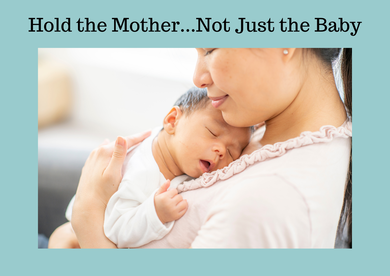Matrescence: How to support a woman as she transitions into motherhood

One of my favourite parts of being a doula is bearing witness to a woman’s transition into motherhood. The transition begins in pregnancy with profound physical, hormonal, psychological and emotional changes. In fact, there is a name for this transition, “Matrescence” (rhymes with adolescence).
Just as in adolescence, matrescence is a time of life that is often fraught with a rollercoaster of emotions, self-doubt and insecurity. These feeling are normal. Very often, along with the emotional identity shift of becoming a mother and the enormous hormonal changes, comes sleepless nights, breastfeeding challenges and the responsibilities of caring for a newborn. It is estimated that at least 80% of new mothers experience some form of what is clinically labeled as “postpartum mood and anxiety disorder”. While it’s important to acknowledge that this transition can be very challenging, labeling the feelings as a ‘disorder’ is deeply disturbing to be. With so many women experiencing these profound emotional shifts it is time to normalize the emotions and find ways to better support new mothers- we need to hold the mother -not just the baby.
Some cultures put enormous emphasis on this pivotal time. For example, in Indian culture, after giving birth a woman usually returns to her mother‘s house, (or her mother comes to live with her), for approximately 6 weeks/40 days- a period of time known as ‘confinement’. During this 'confinement‘ period the woman is nurtured and cared for by her mother and/or other female relatives. The woman is supposed to rest, rejuvenate and replenish. She is not to do any housework or other strenuous activities. Basically she is to be pampered with love and attention. Special attention is paid to her nutrition and her physical well being. She is fed a traditional healing Ayurvedic diet to promote healing, boost her immune system and improve her milk supply. Other eastern cultures have similar practices that recognize the need to hold the mother.
Unfortunately, in western culture, Few of us have the kind of support we need in the days and weeks postpartum. Yet the attention and care we receive is profoundly essential. Those early weeks as a new mom are ones in which support - or lack of - may be one of the biggest factors in how well we make this enormous transition. Many women have little or no support after giving birth and this can have profound longterm consequences for the mother, child and family.
So, how can you support a woman as she transitions into motherhood?
🌸 Before she gives birth: Offer to start a meal train for the family!
🌸 Pick up groceries or bring a nutritious meal over to the family. Don’t expect to be invited in to meet the baby. Simply leave deliveries outside the door so as to not disturb the family’s beautiful “nesting” time.
🌸 If the new mother invites you to visit, look for ways to help out. Do some laundry, run the vacuum, look after an older child.
🌸 In addition to congratulating a new mother, ask how SHE is feeling. Ask her about her postpartum healing.
🌸 End emails, texts or voicemails with, “I know how busy you must be right now, please don’t feel any obligation to respond. Just know that you are being thought of. Know that I am here for you if you need anything at all”
🌸 Sit quietly and listen if the new mother 'chooses' to share her birth story with you.
From my heart to yours🙏
Brenlie
